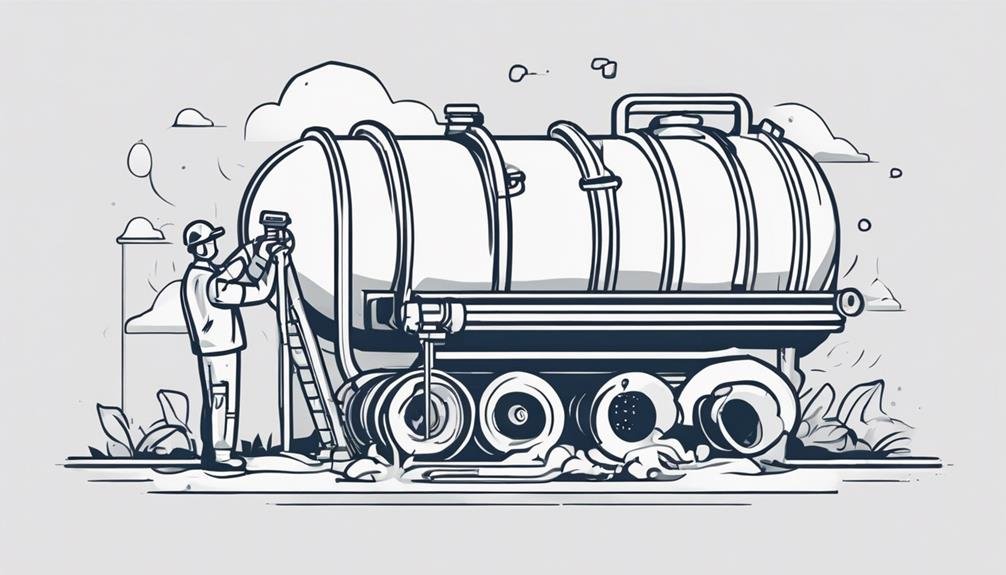When it comes to maintaining your septic tank, staying ahead of the game is key.
You might be surprised to learn that a few simple steps can make a world of difference in preventing costly repairs and unpleasant backups.
By following the top three tips for professional septic tank maintenance, you can ensure that your system operates smoothly and efficiently.
Key Takeaways
- Regular professional pumping prevents system overload and costly plumbing issues.
- Annual inspections ensure early issue detection and system longevity.
- Proper disposal practices and DIY checks complement professional services for optimal septic system health.
- Preventative maintenance saves money, prevents backups, and extends septic system lifespan.
Importance of Regular Pumping

Regular pumping of your septic tank is crucial to prevent costly and damaging backups in your plumbing system. Septic tank pumping is a key aspect of preventative maintenance for homeowners relying on septic systems. Over time, solid waste and sludge accumulate in the septic tank, reducing its capacity to properly treat wastewater. If left unchecked, this buildup can lead to clogs, sewage backups, and potential environmental hazards.
To maintain the efficiency and longevity of your septic system, it's recommended to schedule septic tank pumping every 3 to 5 years, depending on usage and tank size. This process involves removing the accumulated solids from the tank, allowing it to continue functioning effectively. By adhering to a regular pumping schedule, you can avoid the inconvenience and expenses associated with plumbing issues caused by an overloaded septic system.
Prioritizing preventative maintenance, such as septic tank pumping, is essential for ensuring the smooth operation of your household plumbing and minimizing the risk of costly repairs.
Proper Disposal of Household Items
To ensure the proper functioning of your septic system, it's imperative to dispose of household items correctly to prevent potential damage and system failures. Chemical cleaners pose a significant risk to septic systems. These cleaners can disrupt the natural balance of bacteria in the tank, leading to decreased efficiency in breaking down waste. To maintain a healthy septic system, opt for septic-safe cleaning products that are labeled as biodegradable and environmentally friendly.
Non-biodegradable waste such as paper towels, hygiene products, plastics, and grease should never be flushed or disposed of in sinks or toilets connected to the septic system. These items can clog pipes, fill up the tank faster, and require more frequent pumping. Instead, dispose of these items in the trash to avoid potential blockages and system malfunctions.
Annual Inspection and Maintenance

Disposal of household items plays a crucial role in the health of your septic system, now let's focus on the annual inspection and maintenance to ensure its continued functionality and longevity.
- Septic Tank Pumping: Schedule a professional to pump your septic tank annually. This process removes solid waste buildup, preventing clogs and ensuring proper system function.
- Drain Field Maintenance: Inspect the drain field yearly for signs of saturation or standing water. Address any issues promptly to prevent system overload and potential failure.
- Routine Check-ups: Conduct regular inspections of your septic system components, including pipes, baffles, and the tank itself. Look for leaks, corrosion, or other damage that may impact performance.
Frequently Asked Questions
How Can I Prevent My Septic Tank From Overflowing During Heavy Rainfall?
To prevent septic tank overflow during heavy rainfall, ensure efficient rainwater management. Implement proper septic tank landscaping and effective drainage solutions. Regularly inspect and maintain your system to avoid backups. These steps will safeguard against potential issues.
Is It Safe to Use Chemical Drain Cleaners With a Septic System?
Using chemical drain cleaners with a septic system is not recommended. These cleaners can disrupt the natural balance of bacteria in the septic tank, leading to potential issues with the system's functionality over time.
Are There Any Eco-Friendly Alternatives to Traditional Septic Tank Treatments?
When considering eco-friendly alternatives for septic tank treatments, think of them as the lush garden that thrives sustainably with minimal intervention. Look for green alternatives that offer sustainable solutions, ensuring a harmonious system.
What Signs Should I Look Out for That Indicate My Septic Tank Needs Repairs?
You should watch for signs like slow drains, sewage odors, or pooling water in your yard, as these can indicate septic tank issues. Regular septic tank maintenance is crucial to prevent costly repairs.
Can I Plant Trees or Shrubs Near My Septic Tank Without Causing Damage?
You can plant trees or shrubs near your septic tank but choose wisely. Proper landscaping involves keeping plants with non-invasive roots and maintaining root control. Strategic placement and regular checks will prevent damage.
Conclusion
In conclusion, maintaining your septic tank is crucial to prevent costly repairs and ensure proper operation. Imagine the smooth flow of wastewater through your pipes, free from clogs and backups.
By following these top 3 tips for professional septic tank maintenance, you can keep your system running smoothly and efficiently for years to come.
Don't wait until it's too late – take proactive steps to care for your septic tank today.

